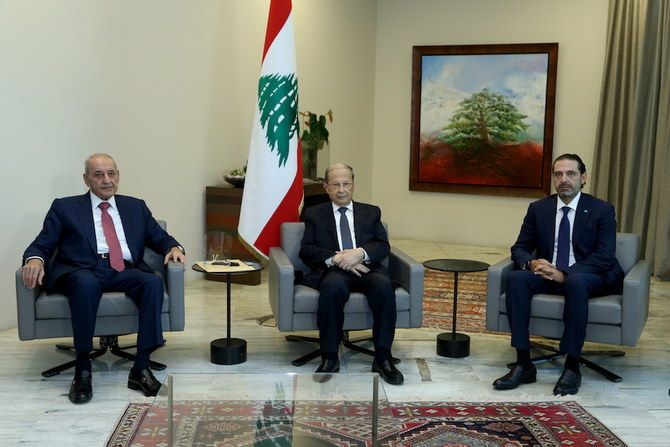BEIRUT: The decision to name Saad Hariri as Lebanon’s next prime minister on Thursday was met with anger, derision and ridicule from jaded Lebanese.
Hariri will hold the position for the fourth time despite months of widespread protests calling for a radical change to how the country is governed.
The massive August explosion in Beirut, which was blamed on corruption among officials, added to the anger towards Lebanon’s ruling class - a patchwork of sectarian, dynastic fiefdoms.
However, it appears the weeks of wrangling to find a new government after the previous one stood down in the aftermath of the blast has not produced the sea change many in the country had hoped for.
Opinion
This section contains relevant reference points, placed in (Opinion field)
The sight of Hariri, who leads the Sunni Future movement, sitting grim-faced next to 85-year-old President Michel Aoun and the Hezbollah aligned parliament speaker Nabih Berri, did little to bring hope to Lebanese suffering under a dire economic meltdown.
“Hariri’s return as PM is a serious slap in the face to all victims of Aug. 4,” Fatima Al-Mahmoud, a freelance journalist, wrote on Twitter in reference to the explosion that killed almost 200 people.
“Their blood has gone in vain and no one will pay the price.”
Myriam Sassine, a Beirut-based film producer, said Hariri’s return showed there is nothing but “disappointment and heartbreak” in Lebanon.
“A year after October’s revolution and the resignation of Saad Hariri, Saad Hariri comes back as PM and savior,” she said. “The only change that happened is that we got robbed, violated and murdered while they're stronger than ever.”
Even the UN’s Special Coordinator for Lebanon Jan Kubis expressed his disappointment at the move.
He said the decision to bring back Hariri was taken by the country’s traditional political forces “regardless of their numerous failures in the past and deep skepticism about the future.”
“It is up to them to help Hariri, the designated PM rapidly create an empowered, action-oriented government, to start delivering the well-known reforms. Do not count on miracles, foreign elections or external donors – the rescue must start in Lebanon, by Lebanon,” Kubis said.
Amid the anger there was also ridicule, as many took to social media to mock Hariri’s return.
“Hariri is like every ex that cheats on you and then cries for a second chance,” wrote one Twitter user.
Others played a game of “spot the difference” with the official photo released today of Hariri, Aoun and Berri, compared to the images used during his previous appointments.
Hariri, 50, stepped down as prime minister almost a year ago as anti-government protests against economic conditions and calling for an overhaul of the system of government raged across the country.
Hariri was replaced by Hassan Diab, whose ineffectual tenure came to an end days after the explosion. The relatively unknown Mustapha Adib lasted for just a month after he took the position from Diab.
The pressure on Lebanon’s leaders has not just come from within. French President Emmanuel Macron set a series of conditions to make sure any new government enacted reforms to stop Lebanon’s slide to financial ruin.
Hariri was returned to the post after he secured the backing of a majority of MPs.
He said he would form a cabinet of “non politically aligned experts with the mission of economic, financial and administrative reforms contained in the French initiative roadmap.”

















